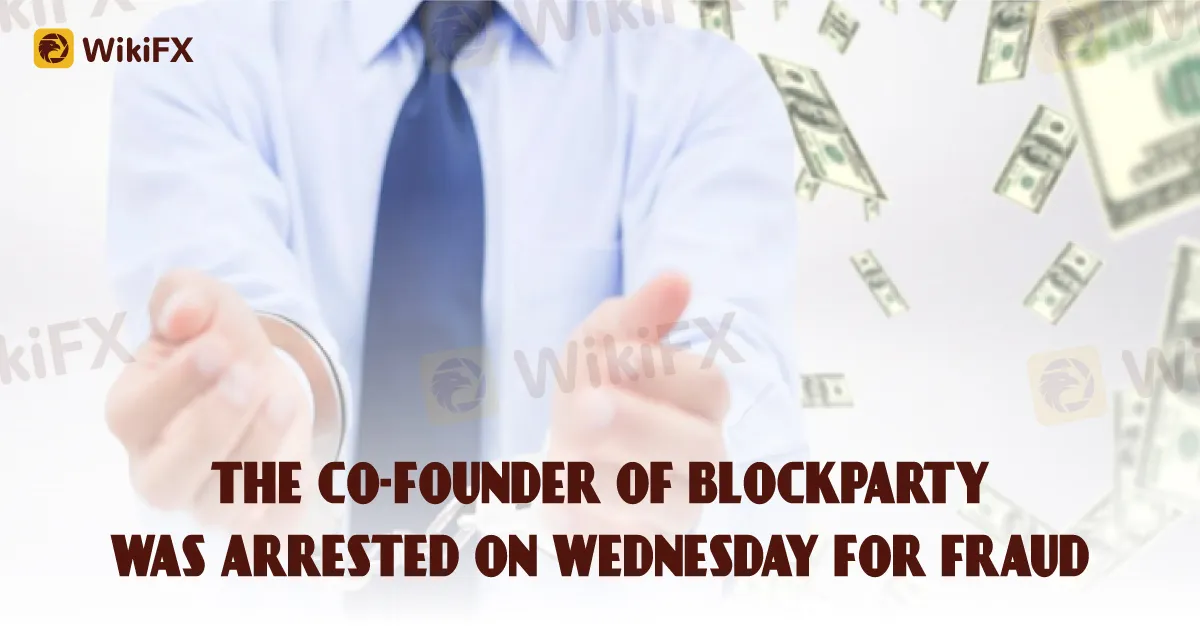简体中文
繁體中文
English
Pусский
日本語
ภาษาไทย
Tiếng Việt
Bahasa Indonesia
Español
हिन्दी
Filippiiniläinen
Français
Deutsch
Português
Türkçe
한국어
العربية
The co-founder of Blockparty was arrested on Wednesday for fraud
Abstract: The FBI on Wednesday arrested Rikesh Thapa and alleged his crime of stealing 1$ million from the "victim company" in Sothern California. The prosecutors claimed that Rikesh Thapa used this money for his personal use.

The background
Last month, the famous crypto exchange FTX filed for chapter 11 bankruptcy protection. Following FTXs downfall, BlockFi also declared bankruptcy. The uncertainty in the crypto industry has become serious like never before. The entire crypto world is bearing a cold winter as a series of bad issues took place in the industry recently.
About Blockparty
According to its website, Blockparty was founded in 2017 by Thapa along with Shiv Madan and Vladislav Ginzburg. Headquartered in New Jersey, Blockparty began as a platform for blockchain-based event ticketing, and launched a marketplace for non-fungible tokens or NFTs in 2020, according to the company's website.
NFTs are blockchain-based assets representing a digital file such as an image, video, or item in an online game. They exploded in popularity in 2021, as crypto-rich speculators rushed to cash in on rising prices, but sales volumes have slumped in recent months.

Rikesh Thapa and Fraud Cases
Rikesh Thapa, 28 years old, was the co-founder and chief technology officer of Blockparty. Thapas LinkedIn profile lists himself as a founder and CTO for Blockparty from Oct. 2017 to Dec. 2019. According to Reuters, the Federal Bureau of Investigation (FBI )on Wednesday arrested Rikesh and alleged his crime of stealing 1$ million from a company in Sothern California. The prosecutors claimed that Rikesh Thapa used this money for his personal use.
The prosecutors said in the indictment on Wednesday. Thapa used this money to consume nightclubs, touring, clothing, and other personal expenditure. In addition, Thapa also has been accused of stealing Bitcoin. In order to cover his crime, he was believed to deleted the CEOs email account.
Thapa defended that he used this money for “safekeeping”. However, if convicted of wire fraud, Thapa could face up to 20 years in prison.
Blockparty has enjoyed a decent reputation in the industry. But the current case will undoubtedly have a huge negative impact on the company, which will no doubt make many investors who trade with this company disappointed.
More Thoughts
It is obvious that Thapa detrays the trust of his company and he will pay for what he did. On the other hand, the current cryptocurrency market is still shrouded in shadow, and investors' doubts about crypto exchanges have not gone away. This fraud case has again dealt a heavy blow to the crypto world. WikiFX will keep an eye on the issue, please stay tuned for further information.
WikiFX brings you up-to-the-minute news from the FX and crypto markets every day. Besides, if you want to know more information about the reliability of certain brokers, you can open our website (https://www.WikiFX.com/en). Or you can download the WikiFX App to find the most trusted broker for yourself.


Disclaimer:
The views in this article only represent the author's personal views, and do not constitute investment advice on this platform. This platform does not guarantee the accuracy, completeness and timeliness of the information in the article, and will not be liable for any loss caused by the use of or reliance on the information in the article.
Read more

Alleged Concerns with TradeEU.global's Trading Practices
An individual trader has come forward with allegations of an unfavourable experience while using the services of the broker TradeEU.global.

Lured by False Promises: Malaysian Driver Lost RM218K to an Investment Scam
A 49-year-old e-hailing driver in Malaysia fell victim to a fraudulent investment scheme, losing RM218,000 in a matter of weeks. The scheme, which falsely promised returns of 3 to 5 per cent within just three days, left the individual financially devastated.

SFC Freezes $91M in Client Accounts Amid Fraud Probe
SFC freezes $91M in client accounts at IBHK, SBI, Monmonkey, and Soochow over suspected hacking and market manipulation during unauthorized online trades.

Italian Regulator Warns Against 5 Websites
The Italian regulator, CONSOB has issued a warning against five websites offering unauthorized financial services. This regulatory action aims to protect the public from fraudulent activities.
WikiFX Broker
Latest News
Saxo & Portuguese Bank Partnership
SEC Fines Broker-Dealers $275K for Incomplete SAR Filings
Lured by False Promises: Malaysian Driver Lost RM218K to an Investment Scam
FTX Sets March 2025 Timeline for Creditor Payouts: What It Means for Investors
What is an Economic Calendar? How it works
Italian Regulator Warns Against 5 Websites
SFC Freezes $91M in Client Accounts Amid Fraud Probe
Bybit Launches Gold & FX Treasure Hunt with Real Gold Rewards
Mastercard's 2030 Vision: Biometric-Driven, Tokenized Payments
What Are the Latest Trends and Strategies in Philippine Gold Trading?
Currency Calculator


